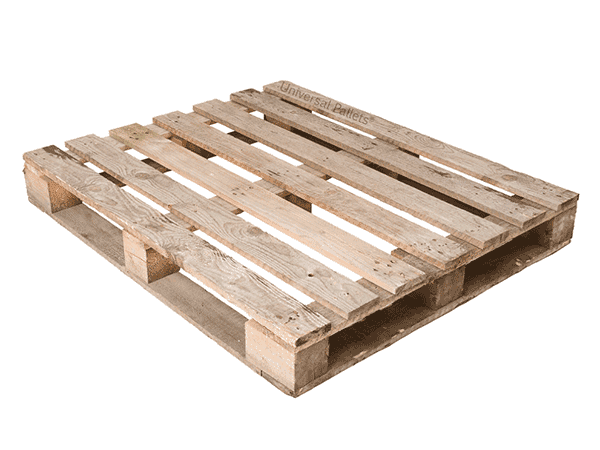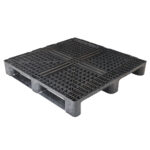The debate over plastic vs wooden pallets continues in 2020, with hygiene concerns more prominent alongside sustainability and cost for obvious reasons! So what factors come into play when you’re choosing to use wooden vs plastic pallets? And which is right for you?
Hygiene
Plastic pallets have long been praised for their hygienic qualities – they can be cleaned more easily than wooden pallets, making them a seemingly obvious choice for food and pharmaceuticals companies. However, once plastic pallets become scratched or damaged, they can become a breeding ground for bacteria, whereas wood retains its natural antibacterial properties.
A recent study carried out by Institut für Holztechnologie in Dresden on behalf of EPAL Germany compared the microbial properties of H1 plastic pallets and standard EPAL wooden Euro pallets. The pallets had all been used at least once, showing different types of wear and tear.
The study found that the wooden pallets had over thirteen times more antibacterial activity than the plastic pallets. Bacteria had a much lower survival rate on the wooden pallets – wood’s natural antibacterial properties help prevent microorganisms from spreading. However, rough patches on plastic from wear and tear provide the ideal conditions for bacteria to thrive.
So when it comes to pallet hygiene, especially around food transportation, wooden pallets are our winner.

Sustainability
Plastic has a large carbon footprint when being made and is not easily disposed of. Wood, on the other hand, is a natural and renewable resource. It’s easy to recycle and it can be disposed of safely too.
Wooden pallets are also more sustainable throughout their lifetime. Once a plastic pallet is damaged, it’s damaged forever – and any cracks or rough patches become breeding grounds for microbes. Wood, however, can be easily repaired and replaced. We have some pallets we affectionately name ‘Trigger’s Broom’ pallets, whose life has been extended hugely thanks to repairs and replacements using parts of other broken pallets. Wooden pallets can have decades of useful life in them if treated well.
We offer pallet repair, and we responsibly recycle any wooden pallets that are beyond use, with a zero landfill policy. So considering how easy it is to repair, reuse and recycle them, wooden pallets are our winner for sustainability.

Cost
New plastic pallets are up to 10 times more expensive than the wooden options when comparing like-for-like, making them a pricey option as well as bad for the environment.
Wooden pallets are much cheaper to buy, making them a better choice when buying in bulk or when a high number of pallets are needed. Plus when you’re done with them, companies like Universal Pallets may actually pay you for them (take a look at our Pallet Collection service for more information).
So once again, wooden pallets are our winner.

The Case For Plastic
At this point, you may be wondering why we even sell plastic pallets! Well there are certainly still some advantages to the plastic pallet:
- Easily cleaned – it’s easy to ‘wipe clean’ plastic pallets, which you can’t do with wooden pallets – this has made them popular for transporting food and pharmaceutical products
- Lightweight – plastic pallets are actually lighter than their wooden counterparts, and so can be handled more easily as well as being energy-efficient when shipping (and cost-efficient when cost is based on weight)
- No heat treatment – wooden packaging must be heat treated if it’s going to be shipped to other countries, but plastic pallets are exempt as they don’t harbour the same pests that make heat treatment necessary
- No splinters – wooden pallets come with a risk of loose nails or stray splinters, as wood can warp and as wooden pallets are repaired over time (whereas once plastic breaks it’s done forever)

Still Struggling To Choose?
Whether you decide to invest in either plastic or wooden pallets, there is an option that will suit your business needs. While we sell plastic pallets, we believe that the benefits of wooden pallets outweigh the cons, so wooden pallets will always be our winners – most of our customers choose wooden pallets. If you’re not sure how to choose, get in touch. We’d be happy to advise based on your individual requirements and concerns.
